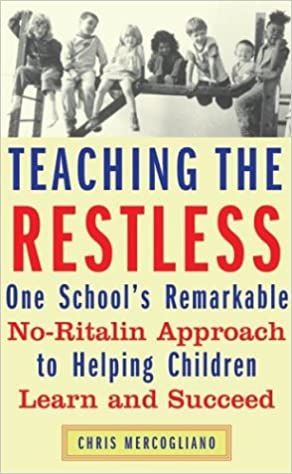Teaching the Restless: One School’s Remarkable No-Ritalin Approach to Helping Children Learn and Succeed
With over 6 million children in the United States being labeled with psychiatric disorders and prescribed medications for said labels, this book makes a strong case against such practices. Teaching the Restless: One School’s Remarkable No-Ritalin Approach to Helping Children Learn and Succeed was published in 2004 and written by Chris Mercogliano, an experienced educator who is the co-director of the Albany Free School in Albany, New York. Mercogliano is able to draw from his experience with the practices from the Free School, which forgoes psychiatric labeling and drugging. Instead, the Free School offers alternative ways to help children learn how to relax, concentrate, manage their emotions, run their lives in a responsible manner and develop healthy relationships. Many of the approaches used at the Free School are community-based.
One main theme of the book is the case study of nine students of the Free School (six boys and three girls) who were all given psychiatric labels and medications at their previous school. Mercogliano reveals in Teaching the Restless how these children succeeded with the Free School’s approach. Mercogliano theorizes that for children with oppositional behavior the best approach is to give them the freedom to choose what they want to learn and to what aspects of the school they want to devote most of their time This teaches the children to look within themselves for motivation. This freedom-based approach also teaches these children to be accountable for themselves, and to their peers and the community.
Teaching the Restless is an excellent tool for both parents and educators to help them understand how to deal with hyperactive children. The book encourages readers to make more of an effort to understand these children and help bring out their positive attributes instead of suppressing them.
About the Author
Chris Mercogliano is an American author who has written numerous books containing well-researched material about children’s education, development and mental health. Beginning in 1973, he taught, and eventually became co-director, at the community and freedom-based inner-city alternative school the Albany Free School . He worked at the Free School for over 30 years. He also serves on advisory boards for other democratic schools. Mercogliano has authored numerous essays. Other books he has written include Making It Up As We Go Along: The Story of the Albany Free School (written in 1998), How to Grow a School: Starting and Sustaining Schools That Work (written in 2006), and In Defense of Childhood: Protecting Kids’ Inner Wildness (written in 2007).
Reviews
Joseph Chilton Pearce, author of Magical Child:
“Teaching the Restless is a very important book for our time. That we continue to prescribe drugs to our children in such massive numbers is appalling. There are no historical precendents for a society perpetrating such a travesty on its offspring. Chris Mercogliano deserves a medal for his courage and insight, as well as his years of hard work on behalf of America’s children.”
Ron Miller, executive editor, Paths of Learning magazine, educational historian, author of What are Schools For?:
“Teaching the Restless is a finely crafted moral commentary on a society that would rather “tranquilize our children than create a more tranquil world for them to grow up in.” Chris Mercogliano is a gifted writer as well as a superb observer of children’s lives. Here, he offers a rich blend of insights and observations based on his own extensive teaching experience. His stories of real kids struggling against the cultural constraints on their lives, including inappropriate labeling and drugging, are deeply moving and convincing.”
John Breeding, clinical psychologist, author of The Wildest Colts Make the Best Horses:
“God bless Chris Mercogliano. He has turned his lifelong commitment to the creation of free learning communities for children and families toward a passionate defense against the oppression of children by psychiatry and the schools. May his longstanding drug-free school zone in Albany extend throughout our country and the world.”











